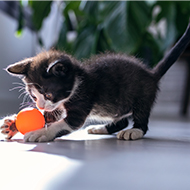
Buyers urged to think carefully when using online adverts.
National feline charity Cats Protection is warning potential owners about the perils of buying a 'lockdown kitten' this Christmas after figures revealed the price of kittens soared by almost 40 per cent during the coronavirus pandemic.
Cats Protection stresses that with prices for cats rocketing by around £100 in the past year, buyers could be duped into buying sick kittens from breeders exploiting the demand for pets.
According to the figures, prepared for Cats Protection, the average price of cats and kittens rose throughout the pandemic to £349.41 in July - a 40 per cent increase from July 2019, when the average price was £253.23.
Jacqui Cuff, Cats Protection’s head of advocacy and government relations, said: “With all of us spending more time at home, it is understandable that many people would want to welcome a new pet into the household. However, we’re asking buyers to think very carefully when using online adverts to find a new kitten.
“The COVID-19 pandemic has created the ideal conditions for unscrupulous pet sellers to thrive, as they appear to have a credible reason for not allowing buyers to view the kitten with their mother first.”
The warning comes after the launch of Defra's '12 Days of Petfished' campaign, which aims to educate the public on the risks posed by untrustworthy sellers at this time of year.
In light of the new research, Cats Protection is calling on members of the public to consider adopting from an animal welfare charity. Since lockdown restitutions were introduced in March, Cats Protection has re-homed some 10,000 cats and kittens via its Hands-Free homing initiative.
The charity is also advising buyers to think carefully before purchasing a kitten from an online advert and refer closely to its Kitten Checklist.
Jacqui Cuff continued: “Before the pandemic, buyers may have heard alarm bells if a seller offered to deliver a kitten to them, or said it was not possible to view the kitten with its mother. But the guidelines and restrictions on visiting other households means it is now very difficult to be sure of a kitten’s background.”



 The Veterinary Medicines Directorate (VMD) is inviting applications from veterinary students to attend a one-week extramural studies (EMS) placement in July 2026.
The Veterinary Medicines Directorate (VMD) is inviting applications from veterinary students to attend a one-week extramural studies (EMS) placement in July 2026.